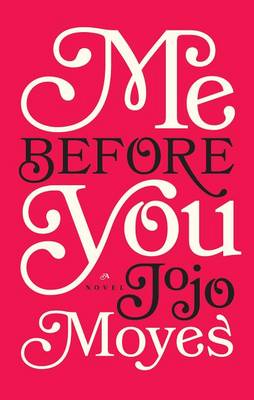I read the book a while back because it seemed like the thing to do what with the movie coming out and all. It was an enjoyable read, very well-written, and very thoughtful. But…I was completely unmoved by this book, which, given the gushing I’d heard about it, left me disappointed. This book is marketed as an inspirational tearjerker and it just didn’t deliver on that front for me. Case in point: Will saying “you’ve made these the best six months of my life” seems completely ridiculous and untrue. Based on his desire to end his life, that is just a thoughtless line designed to manipulate the reader’s emotions.
That being said, to me, this book is about the fact that love cannot heal all, and how we sometimes have to let go of those we love. It was also a lot about loving someone who is not the same as you. Physically, yes—but also in terms of your beliefs. It’s hard to do that, but I think this book shows how a) it can be done, but b) it is so so hard to accept what you see as truly flaws (i.e. his decision to die). It is not a political statement on doctor-assisted suicide; it’s a very singular story about one man’s experience. While there are obviously many people with disabilities who choose to live and love their lives, there ARE ALSO people with disabilities who don’t or can’t. Don’t they deserve a story, too.
A couple thoughts on some of the reviews I’ve read of the film…
Alison Fillmore writes for Buzzfeed:
He can no longer climb mountains or ski down them or anything close, and he’s susceptible to pneumonia. But Me Before You makes it clear that it’s not the difficulty of Will’s new life that’s the real problem—he admits that he could still have a good life—but that he can’t reconcile what he lost. He was the shiny, bright master of the universe once, and now he’s dependent on others, and because of it thinks he’d be better off dead. It’s a point of view that anyone actually living with a serious disability and, in all likelihood, without the resources to have one’s stables converted into sleek, wheelchair-friendly living quarters, will undoubtably find enraging. But it’s also a galling thing to underlie a romance, despite Claflin doing his best to sell Will as a Byronic hero slowly softening to the warmth of his working-class companion. . . . A drama in which everyone, lips trembling, approves of an able-bodied person’s desire for suicide would be obviously repellent, but in Me Before You, a man’s suicidal ideation is treated as tragic but understandable, his disability making his life less worth saving. Isn’t that romantic? No, it’s really not.
I don’t think Will wants to die because he’s dependent on others, I think he wants to die because his dependency makes him unable to do any of the things he used to love. The only thing he has left is his family. And the point of this book is that sometimes love is not enough. Which is true, I think! Furthermore, I don’t think Moyes is trying to make Will’s disability romantic…? To me, the romance was an aside to the larger issues Will was dealing with.
Julia Cooper writes in The Globe and Mail:
There are so few empathetic depictions onscreen of people whose bodies are different than what we call normal. This film is a squandered chance to illuminate the ways in which bodies function differently but feelings like ardour and lust are universal. Instead, Me Before You is clearly disgusted by the needs of the quadriplegic body and Will’s disability is aestheticized. It is as though the film itself is swaddled in soft cashmere. Through dialogue we hear that Will’s pain and suffering is gruesome, so debilitating that questions of suicide and assisted dying lie not far outside of the shot. And yet, we see none of this “ugly” stuff. Will’s insistence that his is not really a life worth living reads, then, as a cold and insidious insistence that in fact it is the disabled life that is not worth living. By contrast, we can look to Hanya Yanagihara’s 2015 novel A Little Life for a complex and affecting narrative of living with and through pain. Without shirking contentious questions of suicide and trauma, it offers a better love story, too.
I agree 100% that it is extremely problematic that Me Before You is one of the only mainstream narratives—film or print—that I can think of. (In fact, I can’t think of any others. I haven’t read [b:A Little Life|22822858|A Little Life|Hanya Yanagihara|https://d.gr-assets.com/books/1446469353s/22822858.jpg|42375710] yet but will bump it up the TBR now.) That is a systemic societal problem. But I don’t think most writers set out to write a book that will change society; they want to tell one story, and that’s what Moyes has done. It is impossible for Me Before You to achieve everything.
I think Julia’s other points are mostly only relevant to the film—readers of the book will have experienced Will’s pain and suffering alongside him, and will not, I think, aestheticize Will’s disability. To me these criticisms are ludicrous because they are so patently nonexistent from the book. It’s hard to separate the book from the film, but I can see how watching the movie without reading the book beforehand would create some issues here.
Overall, I thought Me Before You was an enjoyable read but it didn’t pack the emotional punch that I expected. For me, the most valuable part of the experience of reading this book / watching this film was engaging in the debate about representations of disability in mainstream culture and doctor-assisted suicide.
